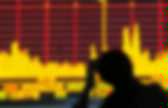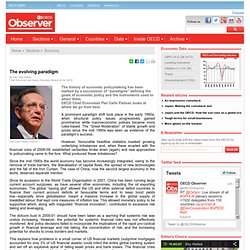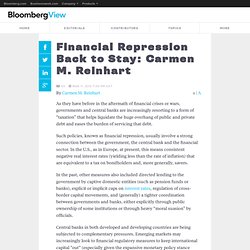

Theories & Projections. The evolving paradigm - OECD Observer. A prominent paradigm shift took place in the early 1990s, when structural policy issues progressively gained prominence while macroeconomic policies became more rules-based.

Financial Repression Has Come Back to Stay: Carmen M. Reinhart. As they have before in the aftermath of financial crises or wars, governments and central banks are increasingly resorting to a form of “taxation” that helps liquidate the huge overhang of public and private debt and eases the burden of servicing that debt.

Such policies, known as financial repression, usually involve a strong connection between the government, the central bank and the financial sector. In the U.S., as in Europe, at present, this means consistent negative real interest rates (yielding less than the rate of inflation) that are equivalent to a tax on bondholders and, more generally, savers. Central banks in both developed and developing countries are being subjected to complementary pressures. Emerging markets may increasingly look to financial regulatory measures to keep international capital “out” (especially given the expansive monetary policy stance pursued by the U.S. and Europe).
Common Cause. Economics in the Crisis. Our poor excuse for an understanding of poverty. In Britain a poor household is officially defined as one with an income less than 60 per cent of the median.

A law passed by the last government declares an unattainable target of reducing the proportion of children who live in poor households to below 10 per cent by 2020. No surprise, therefore, that in today’s austere circumstances Iain Duncan Smith, the UK’s work and pensions secretary, has attempted to start a debate about the definition of poverty. But his motives are not entirely cynical: Mr Duncan Smith has a record of real social concern. People who struggle to find enough food to eat are poor. "Underwriting the Poor" by Olivier De Schutter and Sanjay G. Reddy.
Exit from comment view mode.

Click to hide this space BRUSSELS/NEW YORK – Over the last five years, a sharp rise in food prices has highlighted the global food system’s vulnerability to supply shocks – and reminded the world how tenuous is the food security of millions of people. Unexpected events, such as flooding and drought, can have dire consequences: sharp drops in rural incomes, surging food bills, and severe food shortages. Prioritize the Poorest. <br>Students display their work at the Anganwadi centre in Jamsaut village in Bihar.

(Gates Foundation/flickr) Making Modernity Work. We are living, so we are told, through an ideological crisis.

The United States is trapped in political deadlock and dysfunction, Europe is broke and breaking, authoritarian China is on the rise. Protesters take to the streets across the advanced industrial democracies; the high and mighty meet in Davos to search for “new models” as sober commentators ponder who and what will shape the future. In historical perspective, however, the true narrative of the era is actually the reverse -- not ideological upheaval but stability. Today’s troubles are real enough, but they relate more to policies than to principles. The major battles about how to structure modern politics and economics were fought in the first half of the last century, and they ended with the emergence of the most successful system the world has ever seen. To continue reading, please log in. Don't have an account? The Economics of Disaster - Justin Yifu Lin and Apurva Sanghi. Exit from comment view mode.

Click to hide this space WASHINGTON, DC – Despite all of the gloomy economic news nowadays, if we thought that things couldn’t get much worse, we had a grim reminder this month that that no country is immune to the forces of nature and the havoc they wreak. Two years ago, on January 12, 2010, Haiti was struck by a devastating earthquake that killed more than 220,000 people and shattered the country’s prospects. As strange as it may sound, traditional Chinese medicine has much to teach us about dealing with disasters – in particular, to pay more attention to prevention than to therapy. In the same way, it is best to focus on reducing natural-disaster risks through prevention. According to a recent report released by the World Bank and the United Nations, Natural Hazards, UnNatural Disasters: The Economics of Effective Prevention, an ounce of prevention in planning for disasters is worth a pound of cure.
How donors channel aid matters. The Political Economy of Peace - Graciana del Castillo. Exit from comment view mode.

Click to hide this space MONTEVIDEO – January 16 marks the 20th anniversary of the peace agreement between El Salvador’s government and the Frente Farabundo Martí para la Liberación Nacional (FMLN). Signed at Mexico City’s Chapultepec Castle, the agreement ended a 12-year civil war that killed roughly 100,000 in a country of about five million people. Economy on the Edge of a Nervous Breakdown. I just returned from a trip to New York, where earlier last week I gave a talk at the Council on Foreign Relations.

The topic was the question on everyone’s mind these days: the outlook for China’s economy. Over the past several weeks, a number of news reports and market figures have caught my attention, which appear to indicate that China’s economy may be approaching a crisis. I use the word “crisis” in the traditional (or medical) sense, meaning a critical turning point when tensions or contradictions are resolved, for better or worse — sometimes in unexpected ways. One potential interpretation of this crisis is that China is entering the terminal stage of a bubble, and that what we are seeing are the early signs of a much broader collapse.
But it may not be that simple. Emerging Markets’ Decade of Disruption - Javier Santiso. Exit from comment view mode.

Click to hide this space Over the past decade, emerging markets have become the global economy’s main growth engine. According to HSBC, 19 of today’s emerging-market countries will be among the world’s 30 largest economies in 2050, and they will be more important than the current OECD countries. Emerging markets have already captured 40% of world GDP and 37% of global foreign direct investment. And, while OECD countries continue to stagnate in 2011, emerging markets are growing strongly. The New International Economic Disorder - Mohamed A. El-Erian. Exit from comment view mode. Click to hide this space NEWPORT BEACH – A new economic order is taking shape before our eyes, and it is one that includes accelerated convergence between the old Western powers and the emerging world’s major new players.
"A World Bank for a New World" by Jeffrey D Sachs. Exit from comment view mode. Click to hide this space NEW YORK – The world is at a crossroads. Either the global community will join together to fight poverty, resource depletion, and climate change, or it will face a generation of resource wars, political instability, and environmental ruin. The World Bank, if properly led, can play a key role in averting these threats and the risks that they imply. The global stakes are thus very high this spring as the Bank’s 187 member countries choose a new president to succeed Robert Zoellick, whose term ends in July. The World Bank was established in 1944 to promote economic development, and virtually every country is now a member.
American officials have traditionally viewed the World Bank as an extension of United States foreign policy and commercial interests. "The Hazard of Second Best" by Mohamed A. El-Erian. Exit from comment view mode. Click to hide this space NEWPORT BEACH – The international community risks settling for second best on two key issues to be discussed this month at global meetings in Washington, DC: the lingering (if currently somewhat dormant) European debt crisis, and the selection of the World Bank’s next president.
It is not too late to change course, but doing so will require the United States and governments in Europe to resist harmful habits, and emerging countries to follow up effectively on recent initiatives. In the last few days, European leaders, including French President Nicolas Sarkozy and European Central Bank President Mario Draghi, have declared that the worst of the eurozone crisis is over. Others, like French Finance Minister Francois Baroin, have gone even further, claiming that Europe “has done its part,” and that it is now up to other countries to do theirs. These announcements should come as no surprise. News and views on emerging markets from the Financial Times.
"Equal Treatment for Outward Investors" by Karl P. Sauvant. Exit from comment view mode. Click to hide this space NEW YORK – During the past decade, emerging economies have become important players in the global foreign-direct-investment market. Indeed, the share of world FDI outflows of the more than 30,000 multinational enterprises (MNEs) headquartered in emerging markets rose from roughly 5% in 1990 to more than one-quarter today. "The Broken Legs of Global Trade" by Jagdish Bhagwati. Exit from comment view mode. Click to hide this space NEW YORK – The Doha Round, the latest phase of multilateral trade negotiations, failed in November 2011, after ten years of talks, despite official efforts by many countries, including the United Kingdom and Germany, and by nearly all eminent trade scholars today.
A Clarion Call for Emerging Markets - Eswar Prasad. Exit from comment view mode. Click to hide this space ITHACA – With 2012 underway, it is worth reflecting on how a decade of strong economic growth in emerging markets led to last year’s resounding political transformations. The physics of an economic crisis. By Emanuel DermanThe views expressed are his own. Keen insight into the monetary economy – Alex's Archives. Book Review: Models Behaving Badly. The cost of financial ignorance. Not having reliable information reduces confidence, which in turn leads to credit contractions, fewer or smaller transactions, and declines in demand. And these cause employment and the value of assets to fall. The majority of us in emerging markets know this firsthand, having lived in a chronic credit contraction. To understand why there is no credit without truth, you need only walk down certain streets — the businesses that cannot get significant credit are those in the informal economy, where assets and transactions are not legally recorded and are therefore unknowable.
When property is poorly documented, markets don’t get the information needed to connect assets to finance, and governments don’t obtain the data required to detect which connections have gone awry and how to fix them. This became obvious in 2008, when a relatively small number of subprime homeowners’ inability to meet their mortgage payments ultimately triggered a global financial crisis. The No-Growth Trap. "The Death of Inflation Targeting" by Jeffrey Frankel. Exit from comment view mode. Economists: A Profession at Sea. The G-20’s Dead Ideas. Tax evasion crackdown will raise £62bn for G20 nations, says OECD. Raise Taxes on Rich to Reward True Job Creators: Nick Hanauer. It is a tenet of American economic beliefs, and an article of faith for Republicans that is seldom contested by Democrats: If taxes are raised on the rich, job creation will stop.
Trouble is, sometimes the things that we know to be true are dead wrong. Rethinking the Growth Imperative - Kenneth Rogoff. Exit from comment view mode. Click to hide this space. Slavoj Žižek · The Revolt of the Salaried Bourgeoisie · LRB 11 January 2012. The Brain-Drain Panic Returns - Jagdish Bhagwati. "Free-Trade Blinders" by Dani Rodrik. "Why Fair Trade?" by Robert Skidelsky. "The Cooperative Alternative" by Mahmoud Mohieldin. Think Again: Microfinance - By David Roodman. "The Sustainability Mindset" by Michael Spence. "The Global Innovation Revolution" by Laura Tyson.
"The Mismeasure of Wealth" by Partha Dasgupta and Anantha Duraiappah. "Can the Poor Save the World?" by Jean-Michel Severino. "Emerging Markets’ Europe Problem" by Dominique Moisi. Mind over Mines by Andreas Schleicher. "A Green Alternative to Austerity?" by Roland Kupers. The world economy: Be afraid. Fragile and Unbalanced in 2012 - Nouriel Roubini. When Currencies Collapse. The Exchange-Rate Delusion - Michael Spence. Let’s talk about the market economy. "Grit is Good" by Howard Davies. Friends and Strangers: A Meditation on Money. Schadenfreude Capitalism - Harold James. Global Finance’s Supply-Chain Revolution - Andrew Sheng. "Free Trade Ad Nauseam" by Jagdish Bhagwati. Will Globalization Go Bankrupt? "A Global Perfect Storm" by Nouriel Roubini. Why The Economy Can't Get Out of First Gear)
"The Shadow of Depression" by J. Bradford DeLong. Chicago Booth Blog: Fault Lines by Raghuram Rajan - Fault Lines by Raghuram Rajan. "Openness in Extraction" by Lisa Sachs and Shefa Siegel. Does stimulus cure recession? Does Austerity Promote Economic Growth? - Robert J. Shiller. Does Debt Matter? - Robert Skidelsky. "Good and Bad Deficits" by Robert Skidelsky. A Crisis in Two Narratives - Raghuram Rajan. Welcome Back to 1931. The Perils of 2012 - Joseph E. Stiglitz. Repairing the Global Plumbing - Mohamed A. El-Erian. Free exchange: The hangover. The End of the Win-Win World - By Gideon Rachman. "The Big Easing" by Daniel Gros. A real market economy ensures that greed is good. Help Wanted - By Byron Auguste, Susan Lund, and James Manyika.
Mind over Market - Michael Spence. Taking Back Globalization - Olivier De Schutter. On a Knife's Edge - By Mohamed El-Erian. "Scary Oil" by Nouriel Roubini. "Sky-High Protectionism?" by Jean Pisani-Ferry. BRICS and Mortar by Zaki Laidi. The Price is Wrong. Bye-Bye OPEC - By Logan Bayroff. The Coming Oil Crash - By Steve LeVine. "Bringing It All Back Home" by Howard Davies.